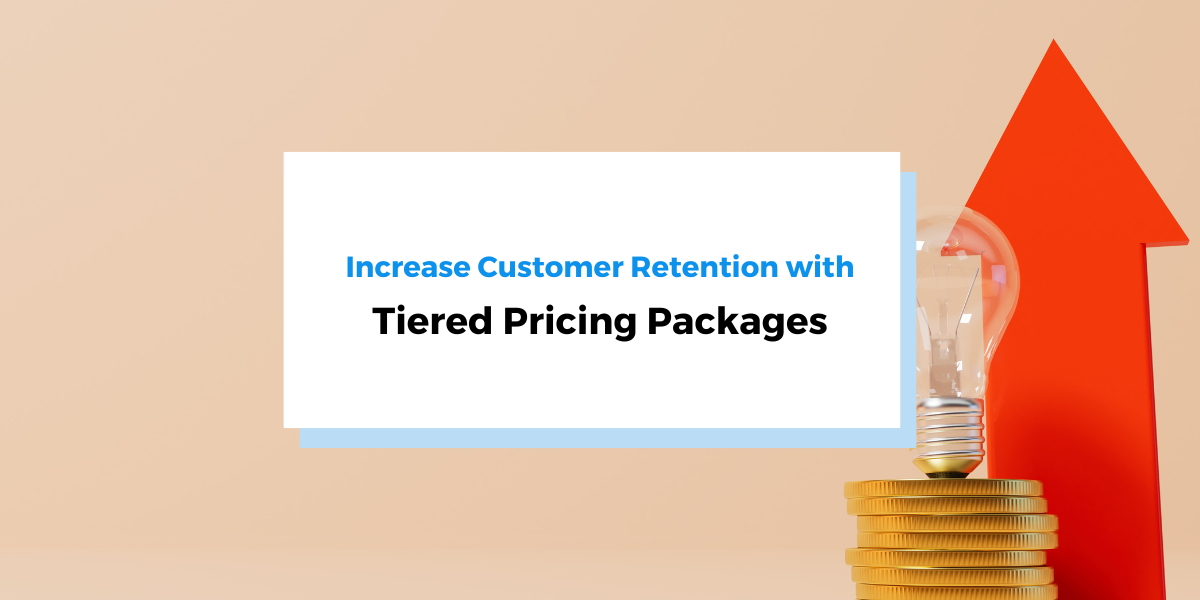You probably don’t need convincing that the internet is useful.
Everything we used to do in person, we now prefer to do online—like making mobile check deposits instead of taking a trip to the bank, or ordering delivery instead of heading to the drive-thru.
So why wouldn’t event registration be any different?
The convenience of signing up ahead of time is appealing and comforting for your customers, but it can also lead to many benefits for your brand that you may not have considered.
In this post, we’ll give you six major benefits of taking your event registration system online.
- Centralized Data Management
- Shorter Check-in Lines
- Reduced Booking Errors
- Appealing to International Attendees
- Reduced Environmental Impact
- Improved Communication
- The Benefits of Online Event Registrations Are Endless
Centralized Data Management
Event registration software allows event organizers to collect all relevant attendee information at once—and in one place.
This makes it easier to manage data, keep track of the number of attendees, and make changes when necessary.
The best registration platforms let you store attendee information, accept payments (and track overdue invoices), and manage communication with registrants.
Detailed data analytics then give valuable insights into your processes and conversion rates to better prepare you for making your next event even more successful.
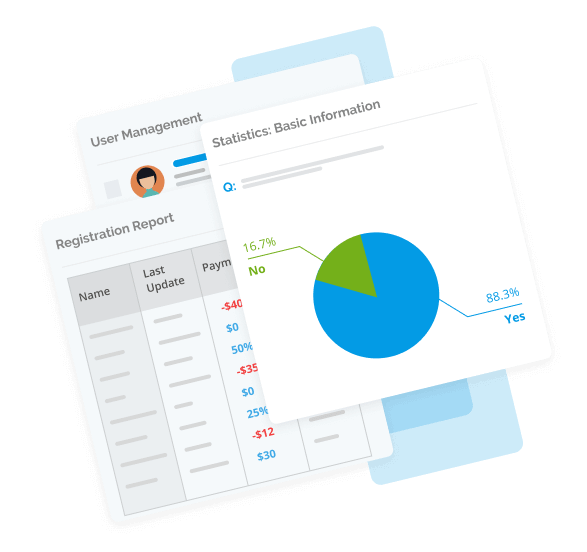
Source: Regpack
Using an online registration tool like Regpack lets your guests purchase tickets ahead of time—and allows you to collect important information about them, such as:
- Names
- Phone numbers
- Email addresses
- Demographic information
- How they heard about the event
While you should keep your event registration page as short as possible to maximize conversions, there are still plenty of ways to collect data about your attendees when they register online.
Even gaining access to their email addresses lets you send a pre-event survey to collect useful information about their demographics, interests, and preferences.
While collecting necessary information about your attendees on the day of the event is possible, there are quite a few upsides to learning what you want to know ahead of time.
For instance, this data can help you promote the event on the most effective channels, choose the right sponsors and vendors, and even fine-tune the entertainment and activities for the event to best serve your audience.
Data management is becoming more sophisticated in the digital world—and brands are gathering, storing, and protecting more detailed information as a result.
To stay ahead of the competition, you need an event registration tool that lets you collect attendee information quickly, easily, and in one centralized place where you can easily find and access it.
Keeping your attendee data in one location lets your team manage your customers, track projects and tasks, and remain flexible enough to manage your events effectively.
Shorter Check-in Lines
No one likes to wait in line, no matter how excited they are for the event.
One of the biggest benefits of registering attendees online is that you take care of much of the mundane data collection and organization tasks ahead of time.
The more ducks are in a row before the event day, the less likely attendees will form a bottleneck at the entrance.
Shorter check-in lines benefit both hosts and attendees, for obvious reasons. Attendees don’t have to wait in long lines, which helps ensure they have a positive experience.
And as the host, all you need to do is scan each guest’s ticket.
When registering in person on the day of the event, you may need to do things like filling out questionnaires, printing name tags, or assigning seating.
When your guests register online ahead of time, much of this administrative work can be done in advance.
You can print name tags, assign seating, and collect all necessary data before the big day.
Then, on the event day, your check-in process is reduced to simply scanning each guest’s ticket.
This simplicity benefits you by saving you both time and money. Since the check-in process is simpler, the line will move faster even with fewer staff members at each check-in point.
You can distribute your staff more efficiently with less stress and bottlenecking at the door.
Reduced Booking Errors
Holding events can have many benefits, which is why event marketing is such a popular marketing tool.
And the better your attendees’ experience is, the better your brand’s results will be.
A smooth and successful event increases attendees’ brand awareness, interest, and trust. As global marketing expert Kristen McCabe writes for G2:
“If you host an event that exceeds attendee expectations, people will remember it. Creating an experience that people remember will also make them remember your brand.”
If you’re using an event to increase your brand recognition or convert leads, interest and trust are the best emotions to strive for.
What better way to increase a prospect’s interest and trust in your brand than to interact with them in person and host a fun and memorable event?
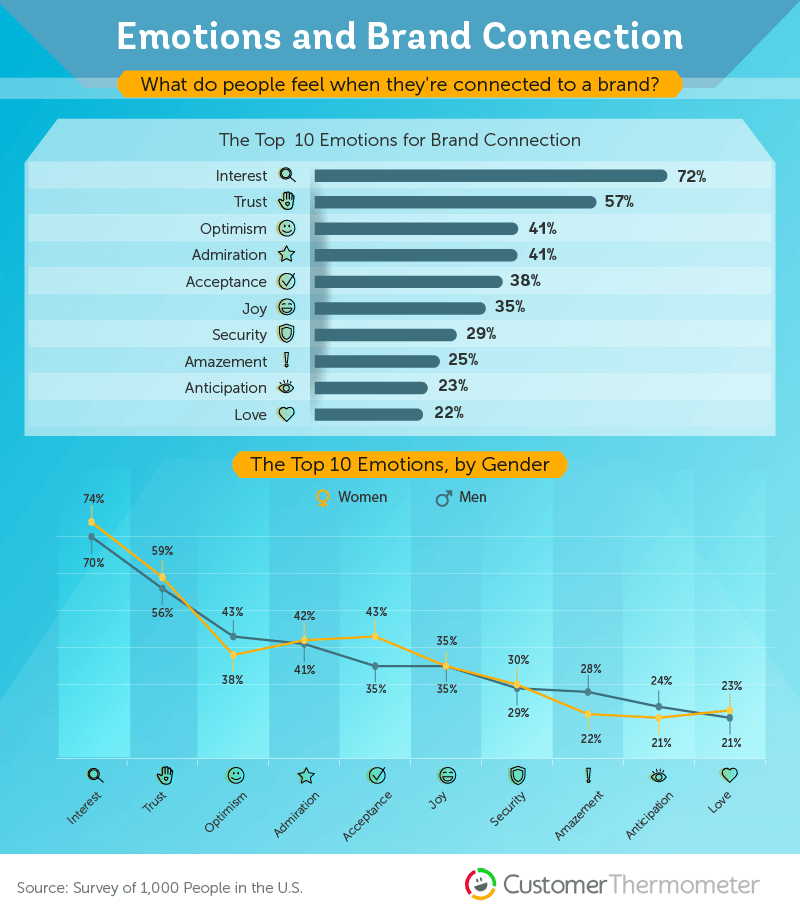
Source: Customer Thermometer
But these warm and fuzzy feelings can quickly dissipate if an event gets off to a rocky start.
Booking errors—such as overbooking, underbooking, or even losing an applicant’s registration form—can leave a sour taste in an attendee’s mouth.
That’s why online registrations are key.
Online event registration can reduce or eliminate many obstacles event planners face when managing bookings and overall event strategy.
When you accept registrations online, you can estimate the number of attendees you’ll have on the day of the event.
This helps you make informed decisions about the size of the venue you need to book, as well as about the amount of event swag or food and refreshments you need to ensure.
Automated event registration tools like Regpack can reduce possible mistakes even further. You won’t have to worry about overbooking or letting registration forms fall through the cracks.
Appealing to International Attendees
With the rise of hybrid and virtual events, it’s no longer uncommon for events to have a global audience.
In fact, virtual events are becoming extremely lucrative across various industries and use cases.
It’s estimated that the global virtual events market size will grow at a compound annual growth rate (CAGR) of 21.4% from 2022 to 2030.
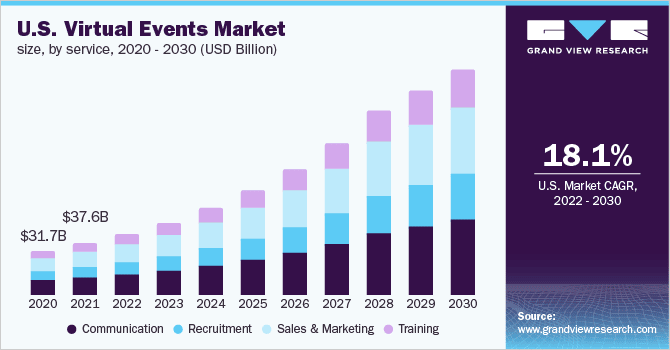
Source: Grand View Research
With the right social and advertising strategy, you can draw in an international crowd and increase your event attendance—especially if you take advantage of virtual and hybrid events.
As Simon Hughes writes for Spacehuntr:
“Today, the internet is a worldwide phenomenon that has revolutionized how we communicate and do business. A company can now craft an ad targeting specific foreign countries for their event and thus attract an international audience.”
By making your registration form available online, you open up your event to a global audience.
The ability to register for an event online makes the event more appealing to international attendees.
When international registrants see that you’ve made the effort to make the event accessible to them, they are more likely to sign up and attend.
It’s also a good idea to make your registration forms as appealing to a global audience as possible.
Start by translating your landing pages and videos into multiple languages (focusing on the geographic locations where you think your target audience lives).
Then, choose an event management tool that accepts payments in multiple currencies.
For instance, Regpack’s multi-currency payment processing lets you charge in any currency and receive payments securely in your clients’ preferred currency—without needing to open multiple bank accounts around the world.
Reduced Environmental Impact
The urge to be eco-friendly permeates all areas of life.
One of the ways event organizers can reduce their brand’s negative impact on the environment is by switching to online event registrations.
When you send a paper invitation or a guest completes a paper registration form, that paper will simply be thrown away days or weeks later.
And in the meantime, you’ll need to use valuable floor space to store paper records—which affects your overall carbon footprint.
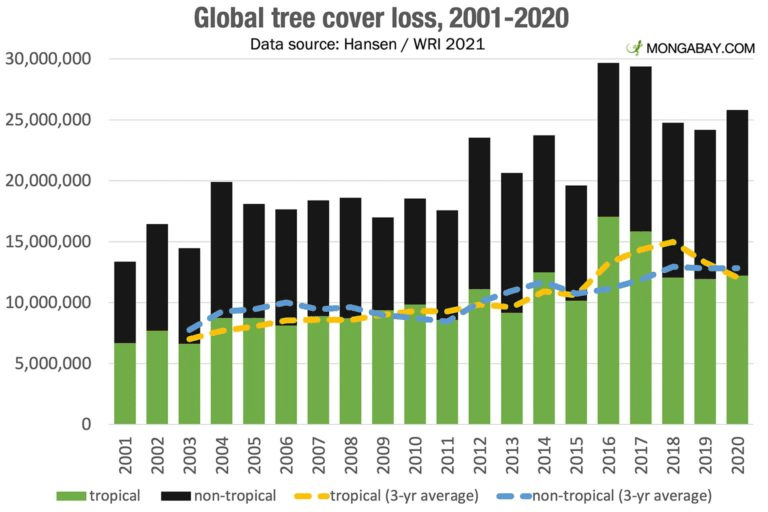
Source: Mongabay
As Nisha N., marketing expert at Zoho, points out:
“From agendas and brochures to posters and worksheets, a lot of paper is used. By avoiding these and going with digital and more eco-friendly alternatives, you can cut down on cost, reduce waste at the event, and save a few hundred trees.”
Allowing guests to register for the event online instead saves you space and money, while helping the environment (and making your data storage more efficient to boot—see benefit #1 above).
And while you’re not doing it for the kudos, it can’t hurt that eliminating your paper registration forms lets you brand your event as “Going Green” and create positive brand awareness.
Improved Communication
Finally, online event registrations make communicating with registrants easier for event organizers.
Registrants must leave their email address in the signup form to receive a registration confirmation—which means you’ll collect the contact information for every attendee.
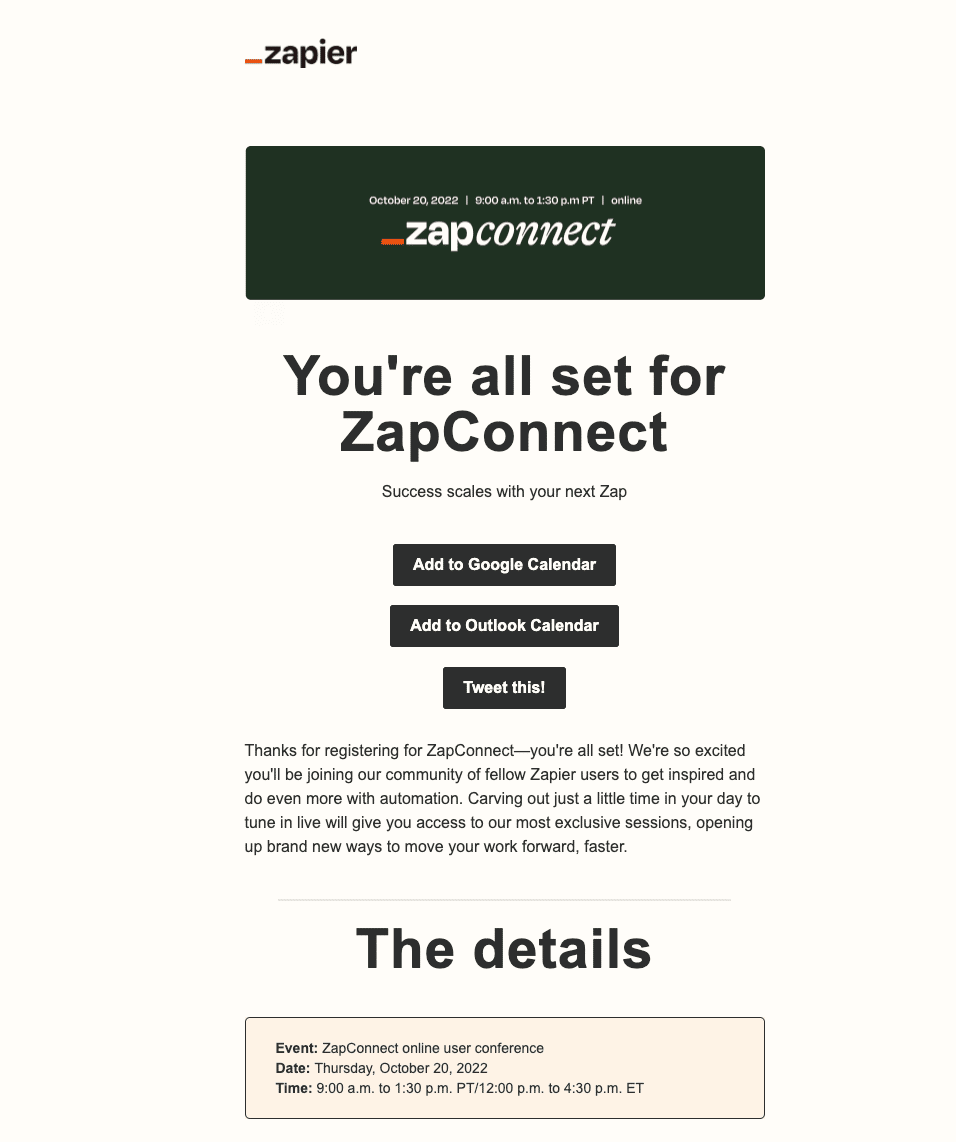
Source: ZapConnect
But your registrants’ email is useful for much more. You can use it to send pre-event surveys, and deliver reminders and updates.
You can also keep registrants excited by sending teasers and interesting information about what they can expect from the event.
By signing up online, attendees can receive automated reminders and schedule update notifications.
And don’t forget to follow up with attendees after the event. With each attendee’s email, you have the power to keep them engaged with:
- A thank-you message
- A recording or key takeaways from the event
- Email newsletters
- Post-event surveys
- Alerts of future events that they may be interested in
The goal of many event marketing campaigns is to collect qualified leads and build an audience. That can’t happen if you don’t have a way to follow up or stay in touch with attendees.
While it’s possible to get reliable contact information from paper registration forms or signup sheets on the day of the event, an online registration process automates and guarantees the collection process.
And the ability to send pre- and post-event surveys helps event organizers get a clear idea of their registrants’ demographics and interests.
You can use this information to design effective and enjoyable events, making sure you’re investing your resources wisely.
The key to improving communication with registrants is to choose event management software that offers robust email marketing tools.
Regpack lets you send emails manually, and we also offer a set-it-and-forget-it option for busy teams.
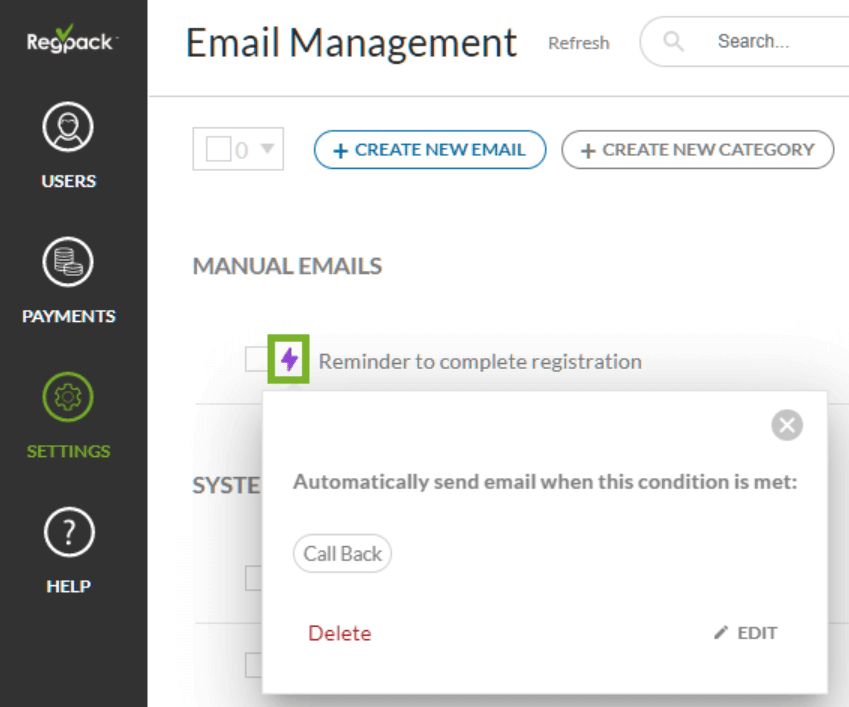
Source: Regpack
You can send an email automatically with triggers, making it easy to send confirmations, payment reminders, and more.
The Benefits of Online Event Registrations Are Endless
While no one needs convincing that the internet makes things easier, it’s helpful to be reminded of all the ways online registrations can help your brand.
Like all humans everywhere, your customers will appreciate the option to register online rather than on paper or in person.
The option to register online makes it easy to register on any device, from anywhere—even internationally.
And collecting registration forms online ahead of time keeps check-in lines short and booking errors minimal (which makes life easier for customers and staff alike).
But the benefits are even greater for event organizers and brands.
An event management tool lets you centralize your data management, keeping you organized, secure, and flexible.
And your online registration form saves you money and reduces your carbon footprint—while also appealing to a global audience, since your form can be accessed anywhere.
Finally, online registration forms let you gather more data than ever.
Your event registration tool can collect email addresses and vital customer information, which lets you fine-tune your events to your audience’s preferences and stay in touch with qualified leads easily.





